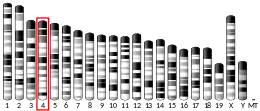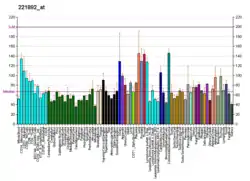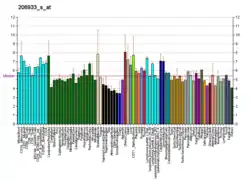H6PD
GDH/6PGL endoplasmic bifunctional protein is a protein that in humans is encoded by the H6PD gene.[5][6]
| H6PD | |||||||||||||||||||||||||||||||||||||||||||||||||||
|---|---|---|---|---|---|---|---|---|---|---|---|---|---|---|---|---|---|---|---|---|---|---|---|---|---|---|---|---|---|---|---|---|---|---|---|---|---|---|---|---|---|---|---|---|---|---|---|---|---|---|---|
| Identifiers | |||||||||||||||||||||||||||||||||||||||||||||||||||
| Aliases | H6PD, CORTRD1, G6PDH, GDH, hexose-6-phosphate dehydrogenase/glucose 1-dehydrogenase, H6PDH | ||||||||||||||||||||||||||||||||||||||||||||||||||
| External IDs | OMIM: 138090 MGI: 2140356 HomoloGene: 48275 GeneCards: H6PD | ||||||||||||||||||||||||||||||||||||||||||||||||||
| |||||||||||||||||||||||||||||||||||||||||||||||||||
| |||||||||||||||||||||||||||||||||||||||||||||||||||
| |||||||||||||||||||||||||||||||||||||||||||||||||||
| |||||||||||||||||||||||||||||||||||||||||||||||||||
| |||||||||||||||||||||||||||||||||||||||||||||||||||
| Wikidata | |||||||||||||||||||||||||||||||||||||||||||||||||||
| |||||||||||||||||||||||||||||||||||||||||||||||||||
Function
There are two forms of glucose-6-phosphate dehydrogenase. G form is X-linked and H form, encoded by this gene, is autosomally linked. This H form shows activity with other hexose-6-phosphates, especially galactose-6-phosphate, whereas the G form is specific for glucose-6-phosphate. Both forms are present in most tissues, but H form is not found in red cells.[6]
References
- GRCh38: Ensembl release 89: ENSG00000049239 - Ensembl, May 2017
- GRCm38: Ensembl release 89: ENSMUSG00000028980 - Ensembl, May 2017
- "Human PubMed Reference:". National Center for Biotechnology Information, U.S. National Library of Medicine.
- "Mouse PubMed Reference:". National Center for Biotechnology Information, U.S. National Library of Medicine.
- Mason PJ, Stevens D, Diez A, Knight SW, Scopes DA, Vulliamy TJ (Jul 1999). "Human hexose-6-phosphate dehydrogenase (glucose 1-dehydrogenase) encoded at 1p36: coding sequence and expression". Blood Cells Mol Dis. 25 (1): 30–7. doi:10.1006/bcmd.1999.0224. PMID 10349511.
- "Entrez Gene: H6PD hexose-6-phosphate dehydrogenase (glucose 1-dehydrogenase)".
Further reading
- Tan SG, Ashton GC (1976). "An autosomal glucose-6-phosphate dehydrogenase (hexose-6-phosphate dehydrogenase) polymorphism in human saliva". Hum. Hered. 26 (2): 113–23. doi:10.1159/000152791. PMID 950237.
- Beutler E, Morrison M (1968). "Localization and characteristics of hexose 6-phosphate dehydrogenase (glucose dehydrogenase)". J. Biol. Chem. 242 (22): 5289–93. doi:10.1016/S0021-9258(18)99426-3. PMID 4169027.
- Toncheva D, Evrev T, Tzoneva M (1982). "G6PD in immature and mature human brain. Electrophoretic and enzyme kinetic studies". Hum. Hered. 32 (3): 193–6. doi:10.1159/000153290. PMID 7106784.
- Ikegwuonu FI, Jefcoate CR (1999). "Evidence for the involvement of the fatty acid and peroxisomal beta-oxidation pathways in the inhibition by dehydroepiandrosterone (DHEA) and induction by 2,3,7,8-tetrachlorodibenzo-p-dioxin (TCDD) and benz(a)anthracene (BA) of cytochrome P4501B1 (CYP1B1) in mouse embryo fibroblasts (C3H10T1/2 cells)". Mol. Cell. Biochem. 198 (1–2): 89–100. doi:10.1023/A:1006954216233. PMID 10497882. S2CID 6713443.
- Strausberg RL, Feingold EA, Grouse LH, et al. (2003). "Generation and initial analysis of more than 15,000 full-length human and mouse cDNA sequences". Proc. Natl. Acad. Sci. U.S.A. 99 (26): 16899–903. Bibcode:2002PNAS...9916899M. doi:10.1073/pnas.242603899. PMC 139241. PMID 12477932.
- Clarke JL, Mason PJ (2003). "Murine hexose-6-phosphate dehydrogenase: a bifunctional enzyme with broad substrate specificity and 6-phosphogluconolactonase activity". Arch. Biochem. Biophys. 415 (2): 229–34. doi:10.1016/S0003-9861(03)00229-7. PMID 12831846.
- Draper N, Walker EA, Bujalska IJ, et al. (2003). "Mutations in the genes encoding 11beta-hydroxysteroid dehydrogenase type 1 and hexose-6-phosphate dehydrogenase interact to cause cortisone reductase deficiency". Nat. Genet. 34 (4): 434–9. doi:10.1038/ng1214. PMID 12858176. S2CID 22772927.
- Clark AG, Glanowski S, Nielsen R, et al. (2003). "Inferring nonneutral evolution from human-chimp-mouse orthologous gene trios". Science. 302 (5652): 1960–3. Bibcode:2003Sci...302.1960C. doi:10.1126/science.1088821. PMID 14671302. S2CID 6682593.
- Ota T, Suzuki Y, Nishikawa T, et al. (2004). "Complete sequencing and characterization of 21,243 full-length human cDNAs". Nat. Genet. 36 (1): 40–5. doi:10.1038/ng1285. PMID 14702039.
- Gerhard DS, Wagner L, Feingold EA, et al. (2004). "The Status, Quality, and Expansion of the NIH Full-Length cDNA Project: The Mammalian Gene Collection (MGC)". Genome Res. 14 (10B): 2121–7. doi:10.1101/gr.2596504. PMC 528928. PMID 15489334.
- Gumuslu S, Yucel G, Sarikcioglu SB, Serteser M (2005). "Application of a new chemiluminescence method for the determination of glucose-6-phosphate dehydrogenase activity in healthy and enzyme-deficient individuals". Journal of Pharmacological and Toxicological Methods. 51 (2): 169–74. doi:10.1016/j.vascn.2004.09.002. PMID 15767211.
- Manco L, Gonçalves P, Macedo-Ribeiro S, et al. (2006). "Two new glucose-6-phosphate dehydrogenase mutations causing chronic hemolysis". Haematologica. 90 (8): 1135–6. PMID 16079115.
- Perifanis V, Tziomalos K, Tsatra I, et al. (2006). "Prevalence and severity of liver disease in patients with b thalassemia major. A single-institution fifteen-year experience". Haematologica. 90 (8): 1136–8. PMID 16079116.
- Gregory SG, Barlow KF, McLay KE, et al. (2006). "The DNA sequence and biological annotation of human chromosome 1". Nature. 441 (7091): 315–21. Bibcode:2006Natur.441..315G. doi:10.1038/nature04727. PMID 16710414.
This article is issued from Wikipedia. The text is licensed under Creative Commons - Attribution - Sharealike. Additional terms may apply for the media files.





